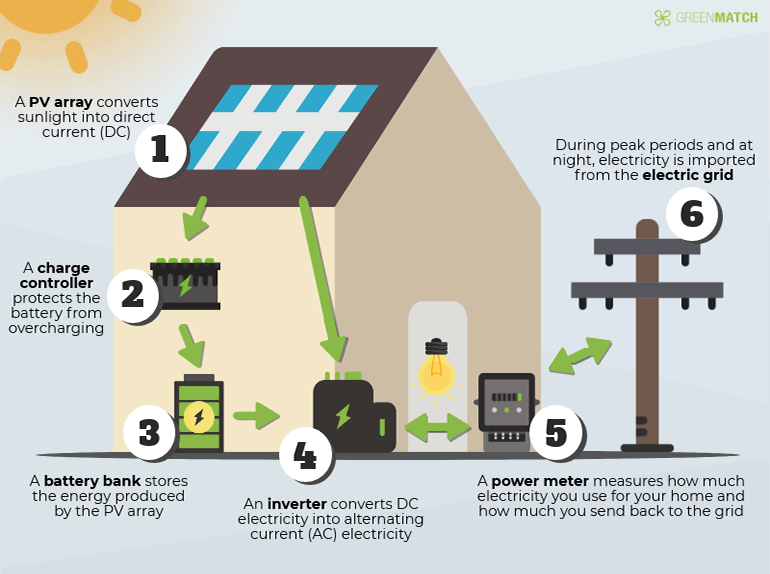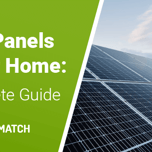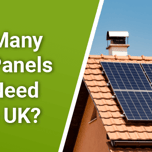Answer these simple questions and we will find you the BEST prices
Which type of solar quotes do you need?
It only takes 30 seconds
100% free with no obligation

Get up to 4 quotes by filling in only 1 quick form

Slash your energy bills by installing solar panels

For the average 2-3 bedroom house
- GreenMatch
- Solar Energy
- Photovoltaics
- Photovoltaic System
Solar Photovoltaic Systems in the UK (April 2025)

What Are Photovoltaic Systems and How Do They Work?
Photovoltaic systems (PV systems) are a renewable energy technology which transforms the energy from the sun into electricity using photovoltaics. These photovoltaics, also known as solar pv panels, provide a reliable green energy solution.
A solar PV system is a sustainable, low-maintenance option for anyone who wants to contribute to a greener environment, as the system does not cause any pollution or emissions and has numerous advantages. Read more on this topic in our 'solar energy advantages and disadvantages' guide.
Photovoltaic systems use photovoltaic cells to collect solar energy from the sunlight, and converts it into direct current (DC) electricity. The reflection of the sunlight will create an electric field across photovoltaic systems, causing electricity to flow.
The DC electricity will be transported to an inverter, which will convert this DC power into alternating current (AC). This AC power is the type of electricity which is used for the electric appliances in your home, also referred to as AC load.
Are you interested in learning more about photovoltaic systems? Let us help you! By simply filling in our 1-minute contact form by clicking the button below, you'll receive up to 3 free, no-obligation quotes from our professional suppliers.
- Quotes from local engineers
- Payment by finance available
- Save up to £1,110 per year
It only takes 30 seconds



Components of Photovoltaic Systems
Photovoltaic systems generally consist of six individual components: the solar PV array, a charge controller, a battery bank, an inverter, a utility meter, and an electric grid. The correct installation of all of these components determines how efficient the solar panels are.
However, a charge controller and battery bank are optional. Even though these two components help you store and, as such, make better use of your generated electricity, they could also increase the total price of the photovoltaic installation.
Even though solar PV arrays produce power when they are exposed to sunlight, the other components are required for properly converting, distributing, and storing the energy that has been produced by the solar panels.
The image below illustrates the photovoltaic system and the relationship of its individual components.

Component 1: Solar Photovoltaic Array
A solar photovoltaic array consists of a number of solar panels that are electrically connected. The solar PV array generates DC electricity from sunlight.
Thanks to the flexibility of modular photovoltaic arrays, PV systems offer many different designs and a wide variety of electrical needs, regardless of how large or small the installation surface is.
It is important to keep in mind that photovoltaic systems must be installed on stable mounting structures that can support the array and withstand weather conditions like wind, rain, and corrosion for the next few decades.
Component 2: Charge Controller
Charge controllers regulate the DC from the solar panels to make sure that the batteries don’t overcharge. A charge controller can measure whether the solar batteries are fully charged, and can stop the current from flowing in order to prevent the batteries from permanent damage.
Charge controllers can be divided into two types: Pulse Width Modulation (PWM) and Maximum Power Point Tracking (MPPT). The PWN is a standard type and is suitable for smaller photovoltaic systems and battery banks, as they vary between 4 and 60 amperes.
On the other hand, the MPPT charge controllers are more suitable for photovoltaic systems with a high voltage of — in most cases — up to 160 volts DC.
Since not every photovoltaic system has a solar battery bank, it is not always necessary to include a charge controller into your system. In other words, you only need a charge controller if you have a battery bank.
Additionally, from a more technical aspect, you might not need a charge controller if your PV array puts out about 2 watts or less for each 50 battery ampere hours.
Component 3: Battery Bank

A battery bank makes sure that none of your unused energy goes to waste, as it stores the energy that is being produced by the PV array and is not consumed immediately. It can then, for example, supply your home with electricity during the night or during very cloudy weather when there is insufficient sunlight.
Including a battery bank in your photovoltaic systems is optional, but it can double the amount of solar energy you can use. With a battery system, your home will be able to use 80% of its generated energy, whereas without a battery system, this would only be 40%.
Component 4: Inverter
A solar power inverter is a key part of any solar photovoltaic system, as it converts electricity from DC to AC. This is necessary since you need AC power for the energy supply of your home appliances.
Component 5: Utility Meter
Regardless of your solar PV system, your household has a power meter that measures the electricity consumption per house or apartment.
The utility meter is connected to the PV system and measures how much electricity you are using in your home. The electricity that you have generated from the photovoltaic panels that and is not stored or used will be fed back into the electric grid.
Component 6: Electric Grid
Only a few homes in the UK are living off the grid. Although renewable technologies make living off-grid possible using solar battery solutions, most homeowners might still opt for a combination of solar- and grid-based electricity.
If your home is connected to an electric grid, the extra power that is generated once your battery bank is full will be sent to the grid. This also means that during periods when the PV system doesn’t cover your energy needs, you will be able to supply your home with power from the electric grid, if necessary.
6 Advantages of Photovoltaic Systems
Photovoltaic systems have a number of advantages over conventional power-generating technologies. The most important ones are listed below.
- Solar PV systems can be designed for a variety of applications and operational requirements, and can, therefore, be adapted to your own personal situation. There are domestic system sizes as well as commercial solar panel sizes.
- Once your solar PV system is properly installed, it will only require minimal maintenance. In addition, their reliability and energy independence will offer you a lifetime of electricity generation.
- Solar PV systems offer sustainable electricity generation, as they rely on a natural resource (sunlight), and their operations don’t create any noise or pollution.
- Since photovoltaic systems are modular, it is easy to expand them or, even, in some cases, transport them.
- Although solar panel installation costs are quite high, it is important to keep in mind that a solar PV system will reduce your electricity bills in the long run, as running them is free.
- The electricity that is generated by the solar PV system can be used to provide heat, too, in combination with an electric boiler. Alternatively, if you are interested in including solar thermal energy in your home, make sure to take a look at solar water heating too.
Solar Photovoltaic System Cost in the UK
Since solar photovoltaic system costs can vary depending on many different factors, there is not a single price but rather a wide range of options and costs. The installation cost for solar panels mostly depends on the size, inclination, and condition of your roof, and the amount of electricity required for your home.
Thanks to an increasing amount of new technologies and cheaper manufacturing, the installation cost of solar PV systems has decreased a lot over the last few years. To give you an idea about the estimated costs per component, we have created the table below.
| System Size | 8 m2 / 1kW | 10 m2 / 2kW | 12 m2 / 3kW | 16 m2 / 4kW |
|---|---|---|---|---|
| PV Array | £1,500 - £3,000 | £2,500 - £3,500 | £4,500 - £5,500 | £5,000 - £6,000 |
| Charge Controller | £15 - £175 | £60 - 1,330 | ||
| Battery Bank | £1,500 - £3,000 | £1,500 - £6,000 | ||
| Inverter | £800 - £1,000 | |||
| Total Cost | £3,815 - £7,175 | £8,315 - £10,175 | £8,560 - £15,330 | £11,360 - £17,330 |
All of the prices you see in the table are estimates for homeowners in the UK. If you would like to know how much you'll specifically be paying, then we recommend you contact a professional installer and request a quote. Luckily, GreenMatch is here to help make this process as easy as possible.
By filling in our 1-minute contact form, you'll be connected with up to 3 different qualified installers near you. Why 3? Getting multiple quotes grants you the freedom to have options to choose from so that you know you're getting the best deal.
Any quotes you receive are completely free and come without obligation. Start by simply clicking the button below.
- Quotes from local engineers
- Payment by finance available
- Save up to £1,110 per year
It only takes 30 seconds



Energy Storage Cost of the Photovoltaic System in the UK
The solar battery storage price banks majorly depend on their capacity, lifespan, and material. The capacity of solar batteries usually ranges from 1 kWh up to 14 kWh, depending on your desired storage size.
Moreover, most photovoltaic systems have a storage capacity for 1 to 5 days. Decide for yourself how many days of stored energy you would need for your home, and how much electricity your PV system is capable of generating and storing.
Do you want to rely on the electric grid and use fossil fuels as a backup, or do you want your home to be powered by renewable energy only? Consider such factors when deciding which type and size of battery bank you will go for.

Other Factors to Consider When Buying a Photovoltaic System
Besides the photovoltaic system components that are mentioned above, there are a few other costs to keep in mind, such as the PV module mounting system and an optional backup generator for off-grid systems.
Furthermore, when buying a photovoltaic system, it is important to keep the solar PV inverter replacement costs in mind. The average solar panel has a lifespan of 25 years, whereas an inverter will need replacement after 10 or 15 years.
The same goes for the battery bank, which will need replacement after 5 or 15 years, depending on how heavily it has been used and how well it has been taken care of.

Find the Best Suppliers for Photovoltaic Systems in the UK
Installing a photovoltaic system in your home is an investment that does not only improve your everyday life quality, but it also lowers the environmental impact of your home’s electricity generation.
However, finding the right photovoltaic system for your home is not easy. The investment in photovoltaics is quite significant and there are many factors to take into consideration. It is, therefore, important to take a thorough look at your options and the different suppliers.
We have created a thorough 6-step guide to help you find the best solar panels in the UK for your home.
We understand the difficulty of choosing the right photovoltaic system for your home, but we are here to help! By simply filling in the contact form at the top of the page, we will provide you with up to 3 quotes from the most qualified suppliers. This service is non-binding and completely free of charge.
- Quotes from local engineers
- Payment by finance available
- Save up to £1,110 per year
It only takes 30 seconds




Natalie was the Content Manager at GreenMatch. She is educated in media & communications, and has several years of international experience in marketing and content creation. Natalie’s focus lies in the areas of finance, sustainability, business communications, and more. She and her content team have been published in reputable sites like EcoWatch, Sunday Post, Earth911, and more.
We strive to connect our customers with the right product and supplier. Would you like to be part of GreenMatch?





